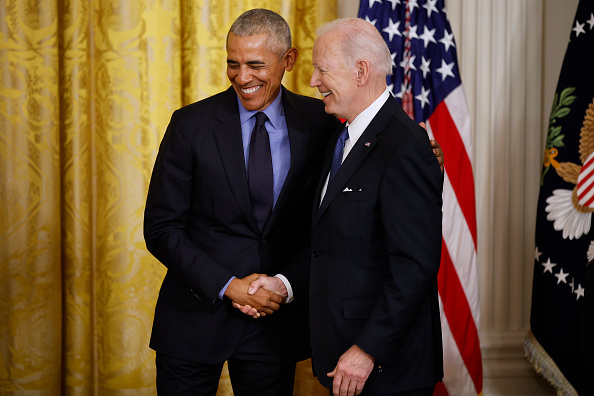Senate Majority Leader Chuck Schumer (D-NY) and Sen. Joe Manchin (D-WV) announced a federal budget reconciliation plan that would extend enhanced subsidies for Obamacare health insurance premiums and impose price controls on Medicare prescription drugs, on July 27.
The Inflation Reduction Act of 2022 replaces the much larger Build Back Better proposal Manchin scuttled in December.
The Schumer-Manchin deal extends subsidies for Affordable Care Act (ACA) policies for three years. It removes the income eligibility limit for subsidies, which was originally 150 percent of the poverty level and was temporarily lifted by the COVID pandemic relief bill enacted in 2021.
Cuts Medicare Drug Spending
The Schumer-Manchin accord pays for the subsidy extension by imposing price controls on certain Medicare prescription drugs (see related article, page 1).
Specifically, the U.S. Department of Health and Human Services (HHS) will “negotiate” Medicare Part D drug prices with pharmaceutical companies. Drug makers that refuse to agree to the government’s price will be slapped with a 95 percent excise tax on their sales. The tax revenue will pay for the Obamacare subsidies. The HHS Secretary will designate 10 drugs for price negotiations in the first year, and at least 20 drugs by the end of the decade.
Having HHS negotiate Medicare prescription drug prices as a funding mechanism for extending enhanced Obamacare subsidies could create other problems, says the Academy of Managed Care Pharmacy (AMCP), in a statement.
“The negative consequences of government intervention in the pharmaceutical marketplace have been illustrated by the best price provisions of the Medicaid prescription drug rebate program, which required manufacturers to provide large rebates to state Medicaid programs,” said the AMCP. “In response to the legislation, drug manufacturers attempted to recoup their lost profits in the government-regulated markets by charging more to consumers in other unregulated markets and gradually raising prices to all markets over time.”
Long-Term Costs
The Schumer-Manchin plan to extend enhanced Obamacare subsidies will cost an estimated $64 billion over three years.
Assuming Congress extends the subsidies again, the cost will balloon, according to an analysis by the Kaiser Family Foundation (KFF).
“The Congressional Budget Office (CBO) expects the enhanced subsidies to cost about $248 billion over the course of ten years if extended permanently,” states KKF. “A large part of the estimated cost is due to the CBO’s expectation that 4.8 million more people would enroll in the ACA Marketplaces than would if the ACA enhanced subsidies are not extended.”
Poor Track Record
The COVID pandemic policy of subsidizing insurance regardless of income was ill-considered, states Doug Badger, senior research fellow in the Center for Health and Welfare Policy at The Heritage Foundation, in an analysis.
“It was based on the false premise that millions of workers and their dependents had lost coverage during the government lockdowns,” wrote Badger. “It poured almost all resources into subsidizing the premiums of people who already had insurance. It made the nation’s highest earners eligible for government premium insurance.”
The Schumer-Manchin deal is a step in the wrong direction for health care, Brian Blase, CEO of Blase Strategies and a senior research fellow at the Galen Institute, told Health Care News.
“Extending the enhanced Obamacare subsidies will exacerbate inflation, increase wasteful spending, lead employers to drop coverage, and provide disproportionate benefit to the health insurance companies and wealthy households,” said Blase. “If congressional Democrats are worried about the political fallout from people losing their subsidies, they should extend the enhanced subsidies to those who already have them.”
Poor Insurance Coverage
Currently, the deductible in the Obamacare exchanges can be as high as $8,700 for an individual and $17,400 for a family of four, says John C. Goodman, the president of the Goodman Institute for Public Policy Research and co-publisher of Health Care News.
“If you combine the average premium that people without subsidies paid last year with the average deductible they faced, a family of four potentially had to pay $25,000 for their health insurance plan before receiving any benefits,” said Goodman. “This is like forcing people to buy a Volkswagen Jetta every year before their insurance kicks in. For families living paycheck-to-paycheck, this is like not having insurance at all.”
One way to evaluate the worth of a product is to see if it can survive the market test, says Goodman.
“That is, are buyers willing to spend their own money to cover the cost of the product being offered,” said Goodman. “A Kaiser Foundation study estimates there are almost 11 million people who have elected to remain uninsured even though they qualify for subsidies in the exchanges. Meanwhile, the unsubsidized part of the ACA market (consumers who pay full price) has been in a death spiral—losing almost half of its enrollment (45 percent) between 2016 and 2019.”
Bonner Russell Cohen, Ph.D. (bcohen@nationalcenter.org) is a senior fellow at the National Center for Public Policy Research.
